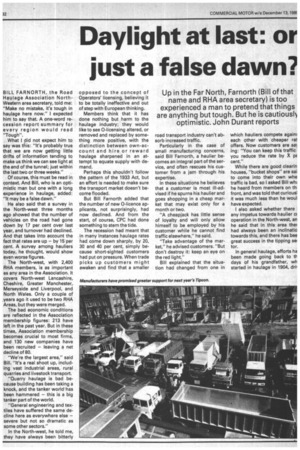Daylight at last: or just a false dawn?
Page 34

Page 35

If you've noticed an error in this article please click here to report it so we can fix it.
Up in the Far North, Farnorth (Bill of that name and RHA area secretary) is too experienced a man to pretend that things are anything but tough. But he is cautiousl) optimistic. John Durant reports
BILL FARNORTH, the Road Haulage Association NorthWestern area secretary, told me: "Make no mistake, it's tough in haulage here now." I expected him to say that. A one-word recession report summary for every region would read "Tough".
What I did not expect him to say was this: "It's probably true that we are now getting little drifts of information tending to make us think we can see light at the end of the tunnel; just within the last two or three weeks."
Of course, this must be read in context. And Bill, who is an optimistic man but one with a long experience in haulage, added: "It may be a false dawn."
He also said that a survey in the North-west three months ago showed that the number of vehicles on the road had gone down by 17 per cent over last year, and turnover had declined. And that takes into account the fact that rates are up — by 15 per cent. A survey among hauliers today, he thought, would show even worse figures.
The North-west, with 2,400 RHA members, is as important as any area in the Association. It covers North-west Lancashire, Cheshire, Greater Manchester, Merseyside and Liverpool, and North Wales. Only a couple of .years ago it used to be two RHA Areas, but they were merged.
The bad economic conditions are reflected in the Association membership figures: 213 have left in the past year. But in these times, Association membership becomes crucial to most firms, and '130 new companies have been recruited — leaving a net decline of 80.
"We're the largest area," said Bill. "It's a real shoot up, including vast industrial areas, rural quarries and livestock transport.
"Quarry haulage is bad because building has been taking a knock, and the tanker world has been hammered — this is a big tanker part of the world.
"General engineering and textiles have suffered the same decline here as everywhere else — severe but not so dramatic as some other sectors."
In the North-west, he told me, they have always been bitterly opposed to the concept of Operators' licensing, believing it to be totally ineffective and out of step with European thinking.
Members think that it has done nothing but harm to the haulage industry; they would like to see 0-licensing altered, or removed and replaced by something more positive, with the distinction between own-account and hire or reward haulage sharpened in an attempt to equate supply with demand.
Perhaps this shouldn't follow the pattern of the 1933 Act, but an effort is needed to make sure the transport market doesn't become flooded.
But Bill Farnorth added that the number of new 0-licence applicants, not surprisingly, had now declined. And from the start, of course, CPC had done something to stem the tide.
The recession had meant that in many instances haulage rates had come down sharply, by 20, 30 and 40 per cent, simply because short-sighted customers had put on pressure. When trade picks up customers might awaken and find that a smaller road transport industry can't absorb increased traffic.
Particularly in the case of small manufacturing concerns, said Bill Farnorth, a haulier becomes an integral part of the service, and often rescues his customer from a jam through his expertise.
In these situations he believes that a customer is most ill-advised if he spurns his haulier and goes shopping in a cheap market that may exist only for a month or two.
"A cheapjack has little sense of loyalty and will only allow himself to be employed by his customer while he cannot find traffic elsewhere," he said.
"Take advantage of the market," he advised customers. "But don't destroy it: keep an eye on the red light."
Bill explained that the situation had changed from one in
which hauliers compete againl each other with cheaper rat offers. Now customers are sa) ing: "You can keep this traffic you reduce the rate by 5( IN cent."
While there are good clearin houses, "bucket shops" are sai to come into their own whe traffic is bad, so I asked Bill whi he heard from members on th front, and was told that curiousi it was much less than he woul have expected.
I also asked whether there any impetus towards haulier cc operation in the North-west, an he said that in this area they had always been an inclinatio towards this, and there has bee great success in the tipping se, tor.
In general haulage, efforts ha been made going back to ti' days of his grandfather, wh started in haulage in 1904, dri, g a Lancashire Steam Wagon id founding Farnorth and Lickworth. He was also RHA anchester secretary in the eventies.
But sooner or later a clash of terests between members is yealed. Bill Farnorth's own ow is that co-operatives should nbark with modest plans, say ranging group insurance and ilk brake lining purchase.
In so many wage agreements various industries during the 3st few years, productivity preements have played a big part; often they are said to be spurious born merely as a way around a wage freeze.
Bill Farnorth believes that, happily, in the case of transport in the North-west, this has not been true. Schemes have been an important feature with many hauliers, having come about when the Wages Council was with us and the basic wage pathetically low.
However, the area regards productivity deals as in-house, and not a matter for area negotiations with the unions.
















































































































